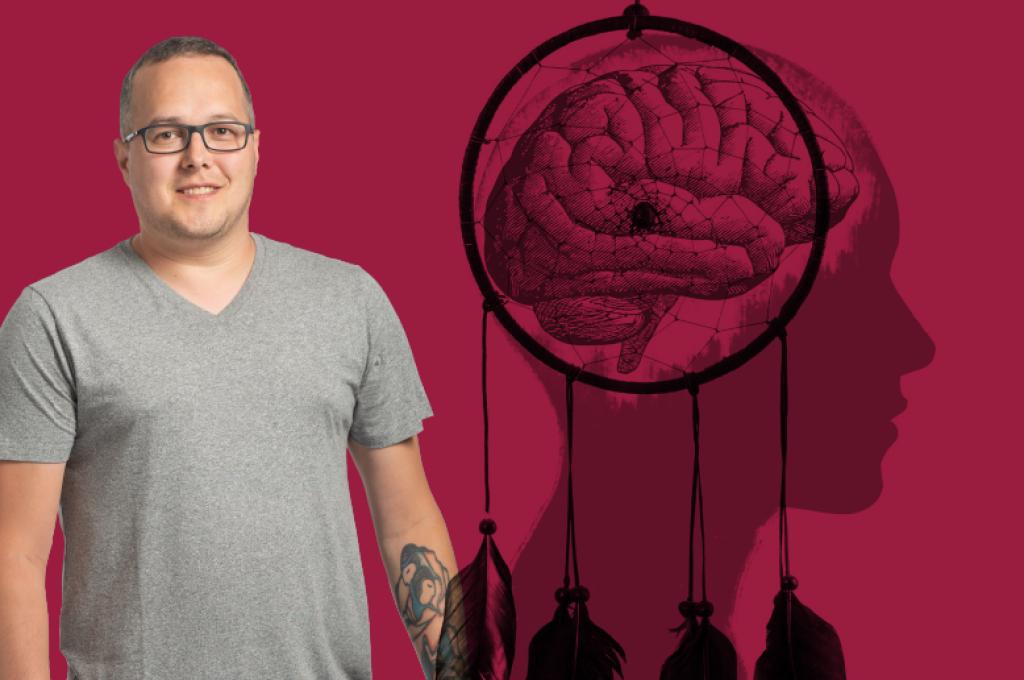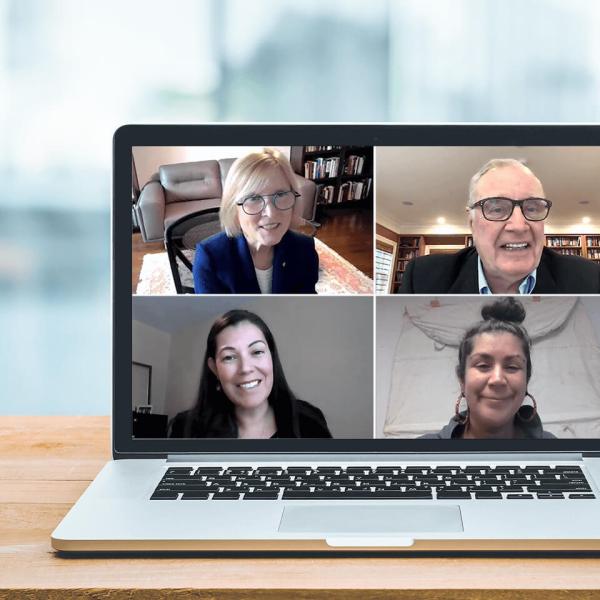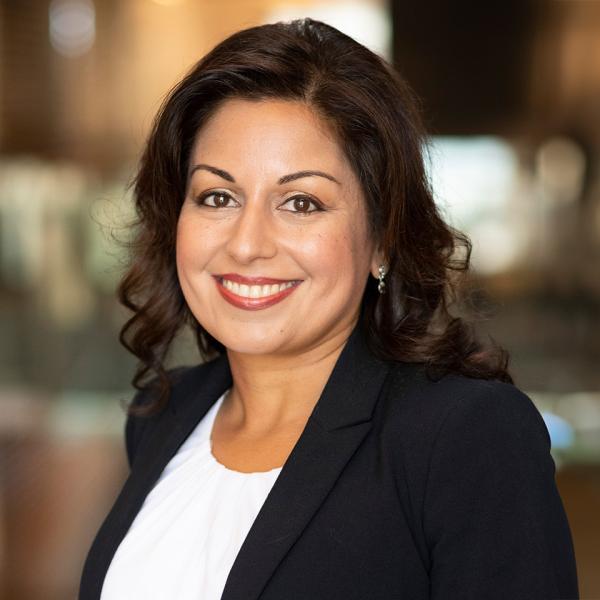Christopher Mushquash’s upbringing in Sioux Lookout, an Ontario town about four hours northwest of Thunder Bay, greatly influenced the kind of researcher and clinician he has become.
Mushquash is Ojibway, a member of Pays Plat First Nation. Growing up, he held a strong interest in science and mental health, which led him to study psychology at Lakehead University.
“When I was an undergraduate student I felt that it would be important for me to develop a skill set that might make me of use to my community,” he says.
Mushquash has gone on to do just that, and much more — while always keeping community at the forefront of his work.
He’s now an associate professor in the Department of Psychology at Lakehead University, Canada Research Chair in Indigenous Mental Health and Addiction and Director of the Centre for Rural and Northern Health Research. He is also a psychologist at Dilico Anishinabek Family Care, a community organization that provides child welfare, health, mental health and addictions services.
In these various postings, Mushquash is focused on mental health and addiction services that meet the needs of Indigenous peoples through a more holistic approach than existing interventions.
In northwestern Ontario, where Mushquash primarily works, there have been gaps in the availability, accessibility and appropriateness of the services in place for people living in remote First Nations communities, Mushquash says. “Our work really focuses on trying to take the very best of what we know from psychological and health literatures, and the very best of what we know from culture-based approaches, and bringing those together,” he says.
One example of this is a 2015 paper Mushquash contributed to that came about after the Federal Framework for Suicide Prevention Act was passed. The Act requires the federal government to develop a national suicide prevention framework. A group of experts was convened by Kathryn Bennett, an epidemiologist at McMaster University, to look at the effectiveness of universal school-based interventions in preventing death by suicide and attempted suicide in youth. Mushquash provided his expertise on rural, northern and First Nations communities.
The paper found that school-based suicide intervention programs, including tools to help students identify risk factors in themselves and their peers, combined with screening and skills training for teachers, can reduce suicide attempts and thoughts. The paper makes six recommendations including that care providers, governments and other decision-makers take culture into account when considering how to serve different communities.
A space to work side-by-side with Indigenous communities
Doing that kind of work requires close collaboration with Indigenous people, including communities and organizations, as well as a new generation of researchers trained in Indigenous mental health and addiction.
Mushquash has a research laboratory at Lakehead University set up just for such important connection and mentorship, thanks to funding from CFI. The space includes seven different workstations for graduate and undergraduate trainees and a full-time research coordinator, as well as a board room with a large meeting table where the researchers can collaborate with community partners.
It’s a comfortable space where leaders and Elders from First Nations, Tribal Councils and other organizations can meet with the researchers to help design research partnerships that are resonant with the priorities of the community.
“It really is the kind of laboratory where a lot of formal but also informal interaction can happen,” he says. “It allows a relatively large number of people to work comfortably together in close proximity, so we all benefit from each other’s experience and knowledge.”
Here, he and his team study aspects of some of the most pressing questions for Indigenous communities, such as the role of adverse childhood experiences in First Nations people who access addictions treatment, evaluating culturally relevant parenting programs for First Nations people, and developing a new intervention approach for First Nations young people with mental health difficulties.
But Mushquash points out that working closely with communities also means getting out of the lab, so he and his team also do things like convening town-hall-type meetings to hear from as many people who are affected by their work as possible.
This kind of collaboration has proven to have important consequences for First Nations in northern Ontario. For example, in a project designed to evaluate on-reserve opioid treatment programming, researchers learned that the federal funding mechanism which required a new proposal to be submitted every year could unintentionally result in a lack of continuity for program delivery and staffing. It also placed an administrative burden on communities whose limited resources were already tapped in dealing with a serious drug problem.
“The opioid crisis had arrived and communities had difficulty providing continuous care for individuals who were seeking healing” says Mushquash. “We’d talk with community members actively working to improve the lives of people with opioid difficulties. They shared their stories and cried together. Yes, it was research. But it was also meaningful to people because of the potential to make a real difference on the ground.” The result of the work was a federal policy change extending funding from one year to three years which allowed communities to sustain their programs and provide more continuous care.
A shifting research relationship
No matter the topic, Mushquash says his research is largely driven by community, specifically listening to a community’s priorities, needs and wants.
“Research in First Nations has not always been of benefit to First Nations,” he says. “In fact, you don’t have to go very far in history to find examples when research in First Nations actually has had detrimental effects and is really done for the benefit of anyone but the First Nation.”
Andrew Dean, Lakehead University’s Vice-President, Research and Innovation, describes Mushquash as an exceptional person who is working hard to address health inequities in northwestern Ontario.
“He’s one of those important researchers that is a very solid academic researcher, while connecting with the Indigenous community in a very culturally appropriate way,” Dean says.
John Dixon is director of Mental Health and Addiction Services at Dilico Anishinabek Family Care, where Mushquash works as a psychologist.
“[Mushquash] greatly respects traditional values and culture, and he has kind of taken it upon himself to shift the research relationship with our organization from one where people kind of come in and want to do research on us, to a relationship where we do research collaboratively and engage communities,” he says.
“It makes research 100 percent more meaningful to us as an agency, and as a people.”
Dixon is particularly excited about a project Mushquash is involved in to develop a child wellbeing measure. The new measure assesses kids on their strengths rather than their weaknesses, an important switch that creates different responses to treatment, Dixon says.
“A way to be helpful”
Mushquash credits his academic journey to mentors who saw promise in him that he didn’t know he had.
After studying psychology at Lakehead University for an undergraduate and master’s degree, Mushquash obtained his PhD in clinical psychology at Dalhousie University and completed his pre-doctoral residency in the Faculty of Medicine at the University of Manitoba, specializing in rural and northern clinical practice.
He returned to Lakehead University in 2011 to start his career. There, he has continued to develop deep relationships working with communities in northwestern Ontario. He’s quick to credit his research successes to a team of people, especially the First Nations communities open to collaborating with him.
He grew up rurally, rooted in Ojibway culture, and continued to work in nonurban and northern settings throughout his training. That upbringing means Mushquash knows firsthand the importance of understanding the culture of the people you are working with.
“I think the thing that drives me is the goal to improve things for our communities,” he says.
“We do have a number of difficulties and I think that I’ve been motivated to try to learn what I can to find a way to be helpful, if I can be.”





